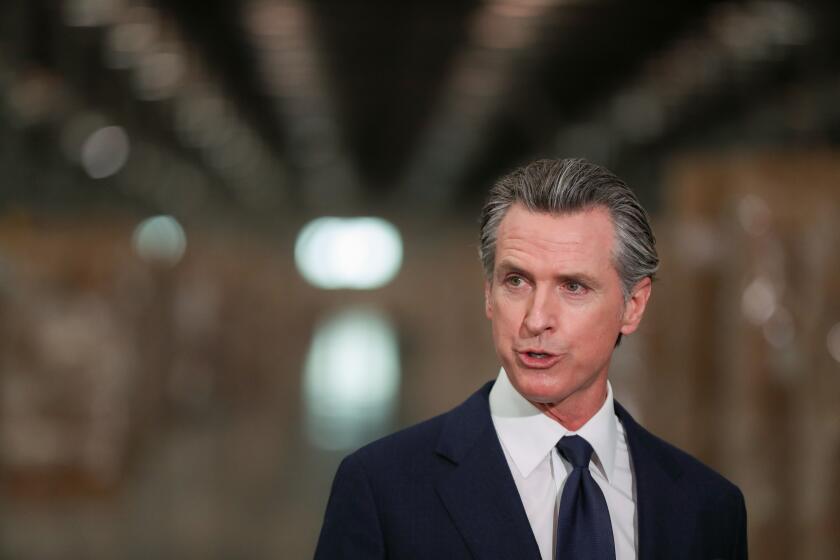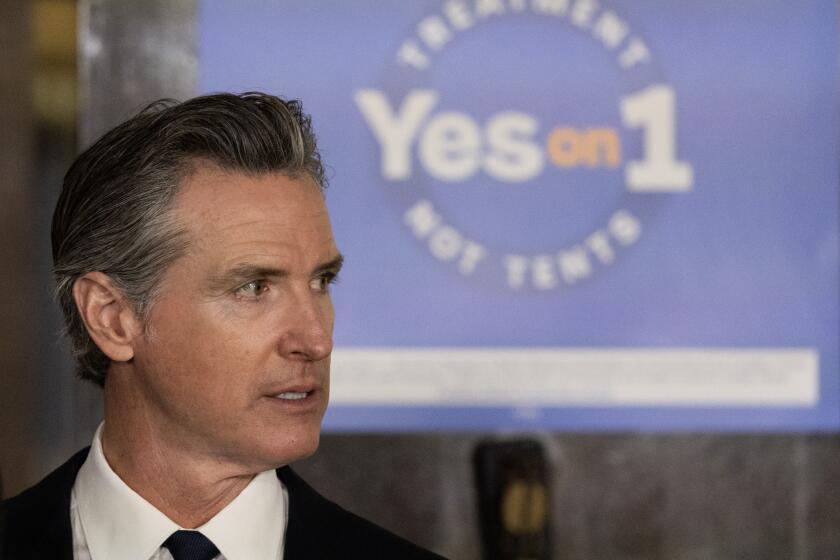Newsom’s Prop. 1 holds narrow lead in California primary

- Share via
Proposition 1, a statewide bond measure that Gov. Gavin Newsom championed as critical to solving the state’s mental health and homelessness crisis, holds a narrow lead in California’s primary election, but the contest was too close to call Wednesday with votes still being counted across the state.
The measure redirects an existing tax on the rich under the state’s 20-year-old Mental Health Services Act to fund services for people with substance abuse disorders and includes a $6.4-billion bond to build more than 10,000 treatment beds.
Newsom campaigned from San Francisco to San Diego in the lead-up to the primary election, urging voters to pass the measure to address the most vexing problem of his governorship and the most visible challenge in his home state, where voters have become alarmed by the number of people living in tents and under freeways in cities large and small.
At rallies and in ads, Newsom portrayed Proposition 1 as an opportunity to correct mistakes of the past when the state shuttered state mental health hospitals in the 1960s without boosting local services, “leading to decades of neglect.”
“Prop. 1 finally writes a new chapter,” Newsom said. “Prop. 1 rights a historic wrong.”
About 181,000 people statewide, including 75,000 in Los Angeles County, are homeless, according to 2023 counts. As much as 82% of unhoused individuals have experienced a serious mental health condition, and nearly two-thirds have at some point regularly used illicit drugs, according to a recent survey by UC San Francisco.
Arguing that the status quo isn’t working, Newsom has pushed a series of policies since he took office to begin to tackle the problem, such as expanding the criteria by which people can be detained against their will to include substance abuse disorders, giving families and authorities the ability to ask courts to mandate treatment for people and expanding the availability of temporary and permanent shelters.
California lawmakers approved Gov. Gavin Newsom’s mental health plan. The overhaul is his latest effort to lessen the homelessness crisis, a vexing problem for the state and its Democratic governor.
For the record:
7:50 p.m. March 5, 2024An earlier version of this article said the Mental Health Services Act was approved by voters in 2023. Voters approved it in 2004.
Proposition 1 complements those efforts by revamping the Mental Health Services Act, which was approved by voters in 2004, to include treatment for those with substance use disorders regardless of whether they are suffering from a mental health condition. The act imposes a 1% tax on incomes in excess of $1 million to fund the expansion of mental health treatment options in California, which will be redirected under Proposition 1.
The measure also increases state oversight of county spending on behavioral health at a time when Newsom has repeatedly questioned the resolve of local governments to fix the problem.
But each step Newsom takes receives pushback from the right and the left.
Liberal organizations worry Newsom’s policies, such as CARE Court and expanding conservatorship, could infringe on civil rights, deter people from seeking help for fear of being forced into care and consign people to harsher treatment settings than necessary. Local governments have raised concerns about their ability to fund the governor’s more ambitious policy directives and to quickly train police and other personnel to abide by the new laws.
Meanwhile, voters are frustrated over the lack of progress and Republicans contend that unchecked liberal rule in California caused the crisis.
Opponents of Proposition 1 called out the large price tag as one reason they wanted voters to reject the measure.
If Proposition 1 is approved by California voters, the bond to build more mental health facilities could cost $14 billion in debt and interest payments.
The California Department of Finance estimates that the Behavioral Health Infrastructure Bond within Proposition 1 would cost a total of $14 billion. Bonds, which are bought by investors, act as loans that the state pays back with interest.
Two bills that sent the measure to the March ballot received rare bipartisan support in the state Legislature, with Republicans and Democrats leaving their party corners to provide voters with a potential solution to an issue plaguing the state. But voters didn’t appear to share the bipartisan spirit by election day.
The measure teetered with only 50% support in a UC Berkeley Institute of Governmental Studies poll co-sponsored by The Times that was conducted in late February. A large majority of Republican voters opposed the measure, raising concerns about how Proposition 1 would fare in an election with higher GOP turnout.
On Wednesday as the race tightened, the Californians Against Proposition 1 campaign called the measure a “monumental mistake” and teased the possibility that Newsom’s “lavishly funded grandiose” ballot effort could go down. Newsom’s side pulled in more than $20 million for the contest, while the opposition struggled to raise money.
“Gov. Newsom may now face one of his worst public defeats ever, failing at a time when he’s been auditioning for a greater role nationally,” said Paul Simmons, a director of Californians Against Proposition 1 campaign, in a statement.
He blamed “poor strategy and decision making by the governor,” if it fails, he said.
Anthony York, a spokesperson for the Yes on 1 campaign, said Newsom’s team remains optimistic with more than 2 million ballots still uncounted statewide, including many from urban counties such as Los Angeles, Alameda and Santa Clara.
Newsom’s campaign pointed out that early votes favored Proposition 1 and Democrats in other races, while the next wave of tallies from votes cast on election day flipped against them. The campaign expects the outstanding votes to favor the measure and expand the lead in the days ahead. Late-arriving mail-in and drop-off ballots cast before the election trend more liberal in typical election cycles.
“It was clear heading into Election Day that, despite the bipartisan coalition of first responders, health care workers, veterans, public safety and families supporting Prop. 1, this was going to be a tough fight,” York said in a statement. “But we know in California that elections aren’t settled on Election Day.”
In a memo written by pollster David Binder before the election, the campaign said high turnout among Republicans and low turnout among Democratic and independent voters would make the race close. Binder also noted a shift among Republicans since 2020 from early voting to voting on election day, and the reality that ballot measures seen as “increasing debt or taxes typically bleed support as we get closer to Election Day.”
Binder predicted the measure could end up passing in the low 50s.
More to Read
Sign up for Essential California
The most important California stories and recommendations in your inbox every morning.
You may occasionally receive promotional content from the Los Angeles Times.













